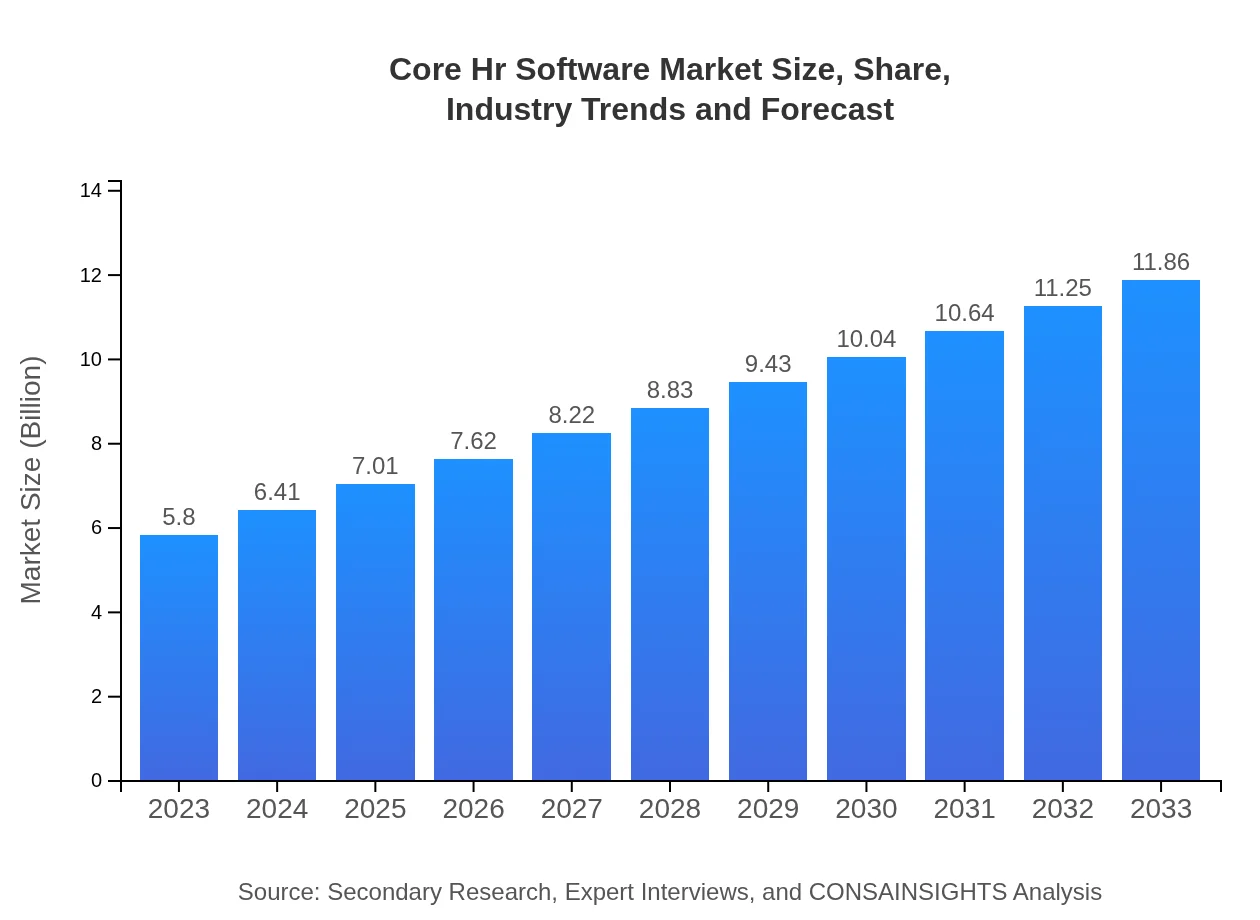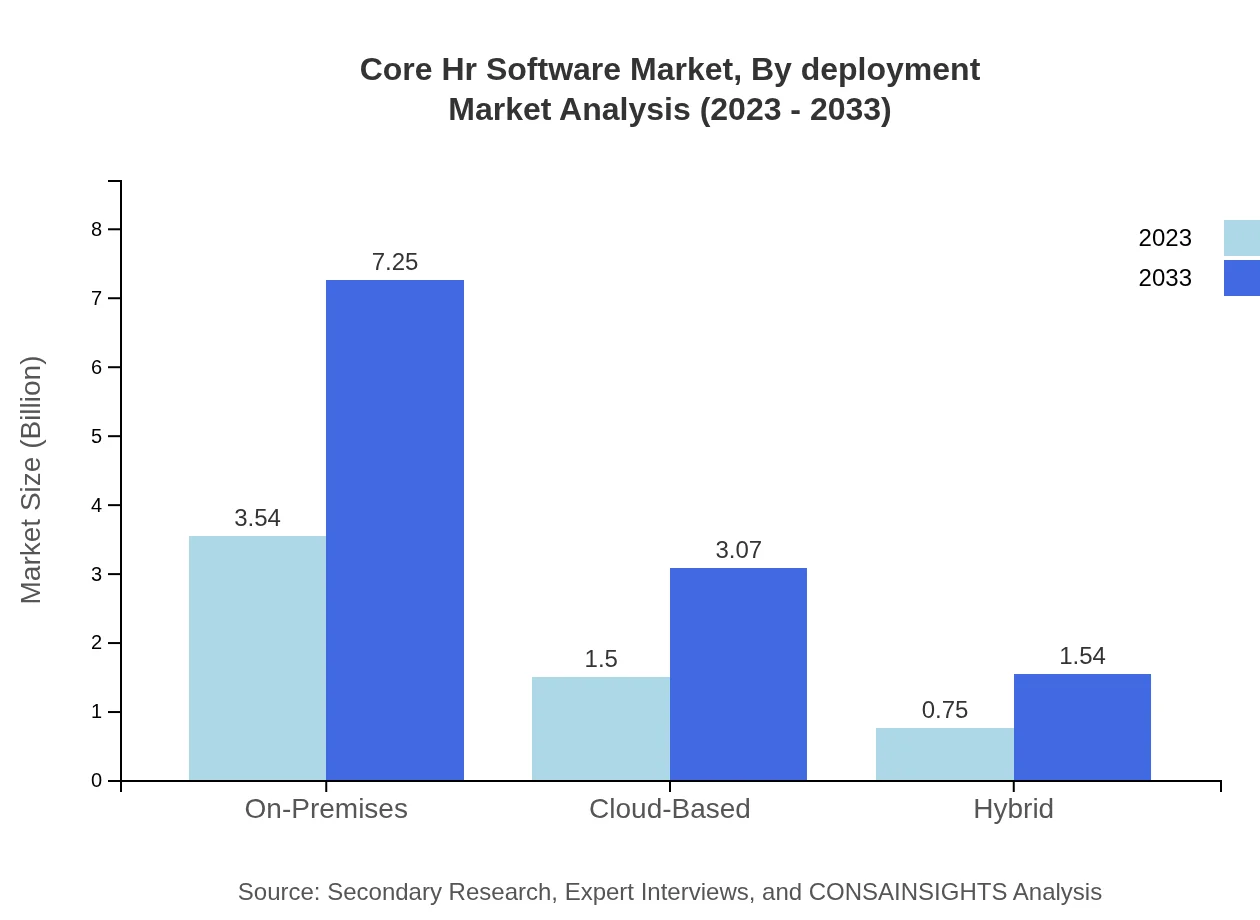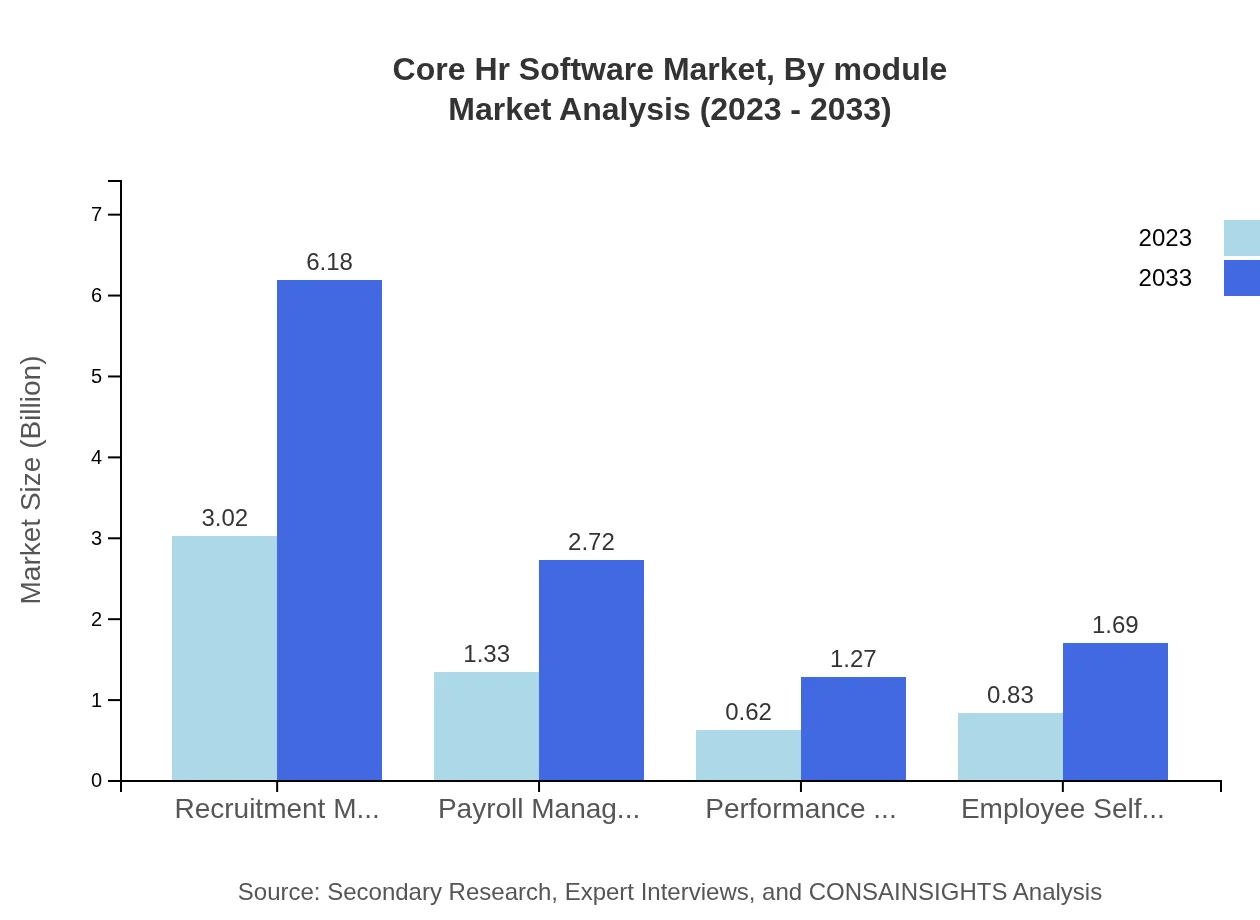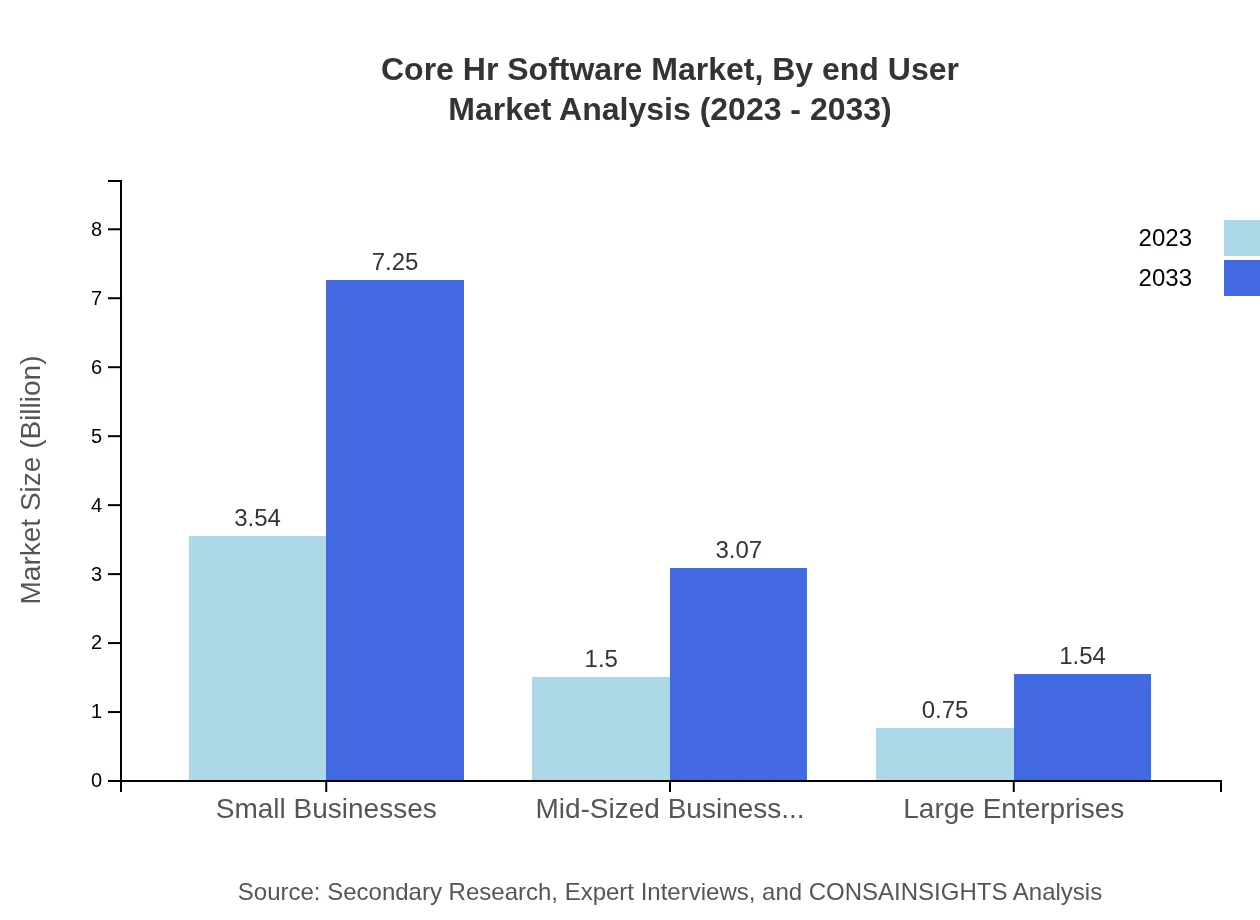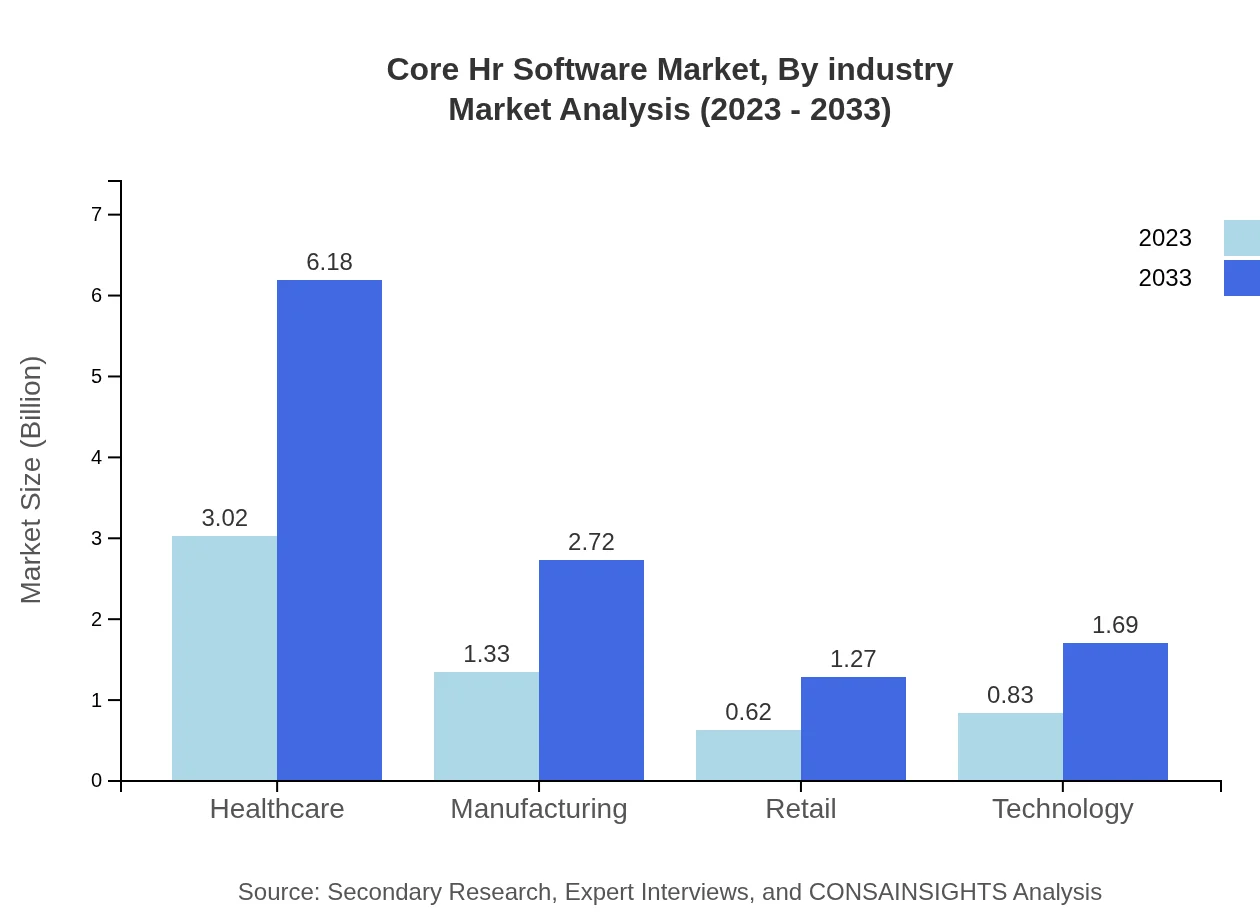Core Hr Software Market Report
Published Date: 31 January 2026 | Report Code: core-hr-software
Core Hr Software Market Size, Share, Industry Trends and Forecast to 2033
This report provides a comprehensive analysis of the Core HR Software market from 2023 to 2033, revealing insights into market size, growth potential, trends, and regional dynamics, along with a focus on key players and technological advancements.
| Metric | Value |
|---|---|
| Study Period | 2023 - 2033 |
| 2023 Market Size | $5.80 Billion |
| CAGR (2023-2033) | 7.2% |
| 2033 Market Size | $11.86 Billion |
| Top Companies | SAP, Oracle, Workday, ADP, Ceridian |
| Last Modified Date | 31 January 2026 |
Core HR Software Market Overview
Customize Core Hr Software Market Report market research report
- ✔ Get in-depth analysis of Core Hr Software market size, growth, and forecasts.
- ✔ Understand Core Hr Software's regional dynamics and industry-specific trends.
- ✔ Identify potential applications, end-user demand, and growth segments in Core Hr Software
What is the Market Size & CAGR of Core HR Software market in 2023?
Core HR Software Industry Analysis
Core HR Software Market Segmentation and Scope
Tell us your focus area and get a customized research report.
Core HR Software Market Analysis Report by Region
Europe Core Hr Software Market Report:
Europe's Core HR Software market is estimated to grow from $1.71 billion in 2023 to $3.49 billion by 2033. Factors contributing to this market size include stringent labor laws driving compliance needs and the growing trend of companies seeking integrated HR solutions to manage their diverse workforces.Asia Pacific Core Hr Software Market Report:
The Asia Pacific region is expected to see substantial growth in the Core HR Software market, with a projected market size of $2.42 billion by 2033, up from $1.19 billion in 2023. The demand is driven by rapid digitalization efforts and a growing emphasis on employee experience across various sectors, especially in India and China where HR technology adoption is increasing.North America Core Hr Software Market Report:
North America holds the largest market share in the Core HR Software industry, with a market size expected to grow from $1.97 billion in 2023 to $4.03 billion by 2033. Key drivers include the advanced state of technology adoption, the presence of major software vendors, and a heightened focus on employee engagement and retention strategies.South America Core Hr Software Market Report:
In South America, the Core HR Software market is projected to grow from $0.52 billion in 2023 to $1.06 billion by 2033. This growth is propelled by the increasing need for efficient workforce management and regulatory compliance among expanding organizations in the region.Middle East & Africa Core Hr Software Market Report:
The Middle East and Africa are expected to experience steady growth in Core HR Software, with the market projected to increase from $0.41 billion in 2023 to $0.85 billion by 2033. The growth is attributed to the rising investment in technology among organizations seeking to automate HR processes and improve efficiency.Tell us your focus area and get a customized research report.
Core Hr Software Market Analysis By Deployment
The Core HR Software market, by deployment type, is primarily categorized into on-premises, cloud-based, and hybrid models. As of 2023, on-premises solutions dominate the market size at $3.54 billion but are projected to maintain the same market share of approximately 61.12%. Meanwhile, cloud-based solutions are gaining traction, growing from $1.50 billion (25.91% share in 2023) to $3.07 billion by 2033. Hybrid deployments are also emerging with a size growing from $0.75 billion (12.97% share in 2023) to $1.54 billion by 2033, catering to organizations seeking flexibility.
Core Hr Software Market Analysis By Module
In terms of modules, the Core HR Software market is segmented into recruitment management, payroll management, performance management, and employee self-service. Recruitment Management holds the largest market share, growing from $3.02 billion in 2023 (52.15% share) to $6.18 billion by 2033. Payroll Management is also significant, increasing from $1.33 billion (22.93% share) to $2.72 billion. Employee Self-Service and Performance Management are expected to see growth, rising from $0.83 billion (14.24% share) to $1.69 billion for the former, and from $0.62 billion (10.68% share) to $1.27 billion for the latter.
Core Hr Software Market Analysis By End User
The end-user segmentation reveals significant insights regarding market dynamics. Small businesses currently dominate the market with a size of $3.54 billion in 2023, accounting for 61.12% of the total share. This market is expected to reach $7.25 billion by 2033. Mid-sized businesses represent a critical segment as well, with a growing share from $1.50 billion (25.91%) to $3.07 billion by 2033. Large enterprises are forecasted to exhibit growth from $0.75 billion (12.97%) to $1.54 billion over the same timeframe.
Core Hr Software Market Analysis By Industry
The industrial analysis illustrates that the healthcare sector remains a leading adopter of Core HR Software, expected to grow from $3.02 billion (52.15% share) in 2023 to $6.18 billion in 2033. Manufacturing uses approximately $1.33 billion (22.93% share), projected to reach $2.72 billion by 2033. Retail and technology industries also show growth, with retail moving from $0.62 billion (10.68%) to $1.27 billion and technology from $0.83 billion (14.24%) to $1.69 billion.
Core HR Software Market Trends and Future Forecast
Tell us your focus area and get a customized research report.
Global Market Leaders and Top Companies in Core HR Software Industry
SAP:
SAP offers a comprehensive suite of HR solutions under its SuccessFactors product line, enhancing workforce performance and employee engagement across various industries.Oracle:
Oracle's cloud-based HCM solutions provide powerful tools for HR management, addressing recruitment, talent management, and payroll functionalities.Workday:
Workday is known for its modern and user-friendly interface, providing solutions for financial and human capital management to organizations worldwide.ADP:
ADP is a well-regarded provider of payroll and HR software solutions, catering to small and large businesses alike with robust automation capabilities.Ceridian:
Ceridian's Dayforce is a cloud-based software that offers integrated HR, payroll, and talent management solutions, enhancing employee experiences and operational efficiency.We're grateful to work with incredible clients.









FAQs
What is the market size of core Hr Software?
The core HR software market is currently valued at $5.8 billion, with a projected CAGR of 7.2% from 2023 to 2033, indicating robust growth prospects in this sector.
What are the key market players or companies in this core Hr Software industry?
Key players in the core HR software industry include major companies like Workday, SAP, Oracle, ADP, and Ceridian, all of which are known for their innovative HR solutions and global reach.
What are the primary factors driving the growth in the core Hr Software industry?
The growth in the core HR software industry is primarily driven by the increasing demand for automation in HR processes, the need for enhanced employee engagement, and the growing trend of remote work necessitating robust HR platforms.
Which region is the fastest Growing in the core Hr Software?
Between 2023 and 2033, the North America region is projected to grow significantly from $1.97 billion to $4.03 billion, making it the fastest-growing market in the core HR software sector.
Does ConsaInsights provide customized market report data for the core Hr Software industry?
Yes, ConsaInsights offers customized market report data tailored to specific needs within the core HR software industry, ensuring that clients receive relevant insights for strategic decision-making.
What deliverables can I expect from this core Hr Software market research project?
Clients can expect deliverables including comprehensive market analysis reports, regional market breakdowns, segment data, and competitive landscape assessments to inform their strategic planning.
What are the market trends of core Hr Software?
Emerging trends in the core HR software market include an increased adoption of cloud-based solutions, integration of AI for recruitment and management, and a shift towards employee-centric software features.

